Ani Margaryan is a clinical psychologist, psychotherapist and expert in educational psychology with over a decade of experience working with adults and adolescents in Yerevan, Armenia. She joined the Armenian Spiritual Revival Foundation in Fall 2023 as part of the first cohort of trainees in narrative therapy. Since then, she has conducted small-group support sessions and facilitated discussions at community events across Armenia, focusing on empowering individuals affected by war to re-author their stories.
Sara Portnoy is a consultant clinical psychologist who has worked with children and their families for over 30 years. Since 2004, she has worked at University College Hospital in London. In 2023 and 2024, supported by Dulwich Centre Foundation, Sara had the opportunity to work with the Armenian Spiritual Revival Foundation to train local professionals and provide support for project development. Her therapeutic work is informed by narrative practice and mindfulness. She developed “The Beads of Life”, a metaphoric practice for working with people whose lives have been dominated by a challenge. In her clinical work, Sara uses a variety of collective narrative practices including collective song writing and collective poetic documents.
Heghine Poghosyan is a humanitarian aid worker dedicated to supporting people in crisis by providing a range of assistance including psychological support. Over the past two years, Heghine has worked with the Armenian Spiritual Revival Foundation as a research and development project manager. She has conducted research on approaches such as narrative therapy to help the team develop culturally and historically sensitive therapeutic methods. Simultaneously, she has led monitoring and evaluation activities to ensure high-quality services were delivered to communities.
Margaryan, A., Portnoy, S., & Poghosyan, H. (2024). “Still standing”: Armenian revivalism and narrative practice – a story of a unique initiative [Photo essay]. International Journal of Narrative Therapy and Community Work, (2), https://doi.org/10.4320/GVXI7101
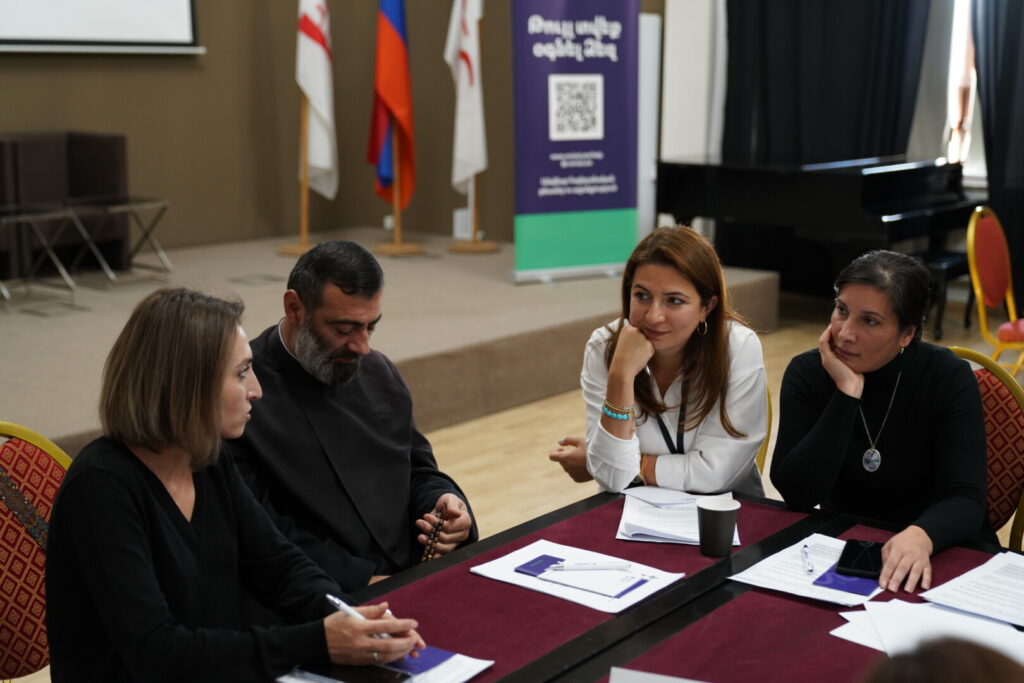
- How can we best address the needs of people in a context where “seeking mental health support” is culturally challenging?
- How have the Armenian people been successful in rising again and again despite having been subject to brutal oppression by great powers over centuries including a genocide in the early 20th century?
- How have the spiritual care traditions of the Armenian Church and spiritual values in general contributed to reviving its people?
- How can Armenians’ experience of being “super-survivors”1 be incorporated in a vibrant mental health service to respond in contexts of war and other crises?
The Armenian people have a long history of finding ways to survive and recover from traumatic experiences. In the past century alone, there have been three events that resonate with Armenians both at home and in many diaspora communities worldwide:
- the Armenian genocide of 1915 to 1923 by the Ottoman Empire
- a devastating earthquake in Soviet Armenia in 1988
- two conflicts with neighbouring Azerbaijan in 1988–1994 and 2020–2023.
The genocide claimed the lives of 1.5million people and resulted in the Armenians’ dispossession of their ancestral homeland. The 1988 earthquake caused the deaths of 25,000 people and led to more than 500,000 people losing their homes. The two wars with neighbouring Azerbaijan resulted in 10,000 being killed on Armenian side and ethnic cleansing of the remaining 110,000 Armenians from their ancestral homes in the unrecognised Nagorno-Karabakh Republic in 2023. The shock of the 2020 war and its consequences brought to the fore elder generations’ memories and stories about the 1915 genocide, creating a sense of continuity, despair and helplessness for many Armenians. It presented the need to meet yet another survival challenge with connections to what past generations had endured.
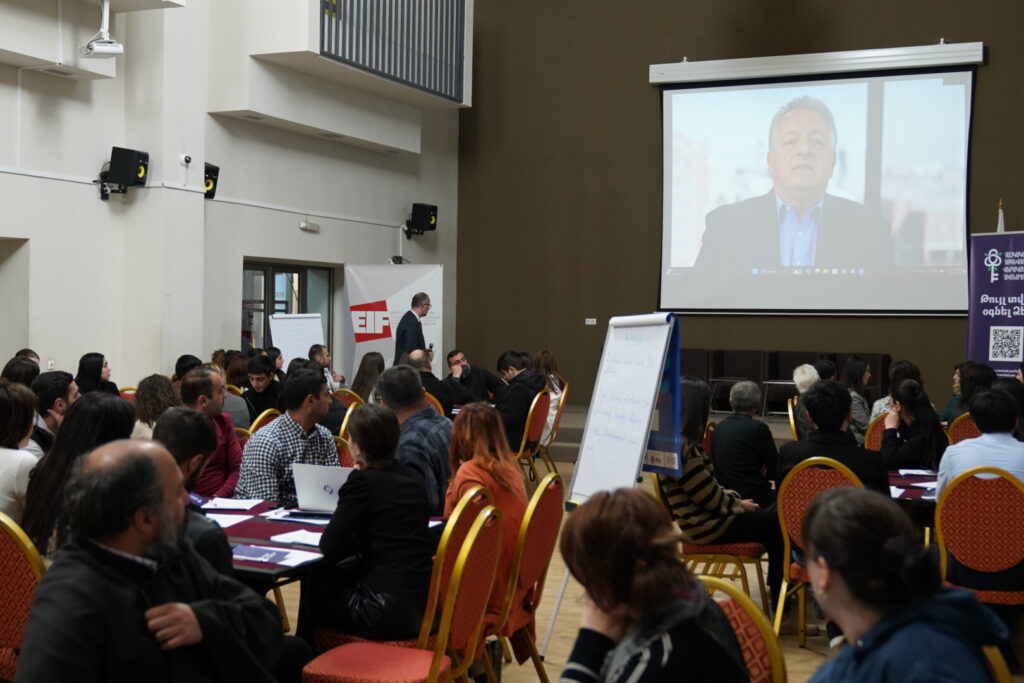
The Armenian Spiritual Revival Foundation2 was established in Summer 2022. Through continuous research and many brainstorming sessions in multidisciplinary teams and with multinational peers, a pilot project engaging with around 150 participants in seven Armenian communities led the Foundation to embrace narrative practice to bring together history and spiritual values. It was chosen because it is a non-pathologising, non-blaming approach that is applicable in group settings and is flexible enough to incorporate cultural and historical considerations in the process of healing.
The narrative approach sees life as multi-storied. This overlaps with the Armenian Spiritual Revival Foundation’s belief that the Armenian people have demonstrated resilience, revival and thriving in many corners of the world despite many traumatic events.
Following the pilot project and coordination with partners at Dulwich Centre Foundation3, a two-week training program was developed and delivered to a group of 30 midcareer psychologists and social workers in Yerevan in Fall 2023. The timing of the program coincided with the ethnic cleansing of 110,000 Armenians in Nagorno-Karabakh, thus reinforcing a sense of urgency for establishing a workable group-based psycho-spiritual recovery program. People in every corner of Armenia experienced difficulty sustaining hope and strength in those most trying times.
Hope for the future became hidden behind a curtain of anxiety
Over the next five months, the Armenian Spiritual Revival Foundation developed and implemented a six-week group support program and ran larger community meetings that reached 1000 participants in six towns. After each of these sessions, the participants, who were from the most vulnerable groups in the population, reported a greater sense of comfort in engaging with others and expressed increased appreciation of their personal agency and ability to take back control in their lives.

First experience with narrative practice in Armenia
The goal of the program was simple: to help people for whom recent traumatic events had caused depression and anxiety to see their lives as multi-storied. We hoped that the participants might not only experience acknowledgment of hardships they had experienced and were continuing to face, but also be invited to recognise the stories of their survival, to tell stories of revival from their own ancestors and those living next to us, and to start imagining the continuation and sustenance of their dreams for their lives ahead. In other words, the program invited the participants to own their own futures, rather than deal with consequences of events.
The Foundation designed a small-group support program rooted in collective narrative practice and a program for community events. They also developed criteria to enable diverse groups of participants to evaluate the impact of the programs.
The program began with community gatherings of approximately 70 participants in each of the six towns. People gathered around tables, and our freshly trained narrative practitioners invited participants to tell their stories and listen to each other. The conversations were facilitated by a questionnaire. The stories told by participants were carefully documented (all stories were collected anonymously to preserve confidentiality and a sense of safety for participants). While sharing their stories, the facilitators and participants wove a new network of community members. These meetings helped a great deal in revealing dominant psycho-spiritual narratives about hardships in these communities, and also elicited alternative narratives. Eight community meetings later, a powerful theatrical performance was developed from the stories that were documented. Towards the end of the program, participants from six communities were invited to watch this performance. This enabled the participants to witness their own double storied accounts of hardship and resilience from a new perspective. It facilitated a completely different, pro-future discussion.
I didn’t know there were other people that feel like me too*
*The most common expression in the feedback that was collected.
In parallel with the community events, we piloted a six-week small-group support program rooted in collective narrative practice. Each 2.5-hour session included a specific series of tasks, activities, reflections and exercises using metaphoric practice. Among the different activities, two stood out for many participants: writing letters to the problem and writing letters to the ancestors. These proved to be efficient tools for externalising hardships and gaining a bird’s eye view on the seemingly unresolvable issues participants experienced.
All the participants had been experiencing distress about the 2020 war and its consequences. Following the group work, many participants reported experiencing a greater sense of personal agency and an increased readiness to embrace the future.
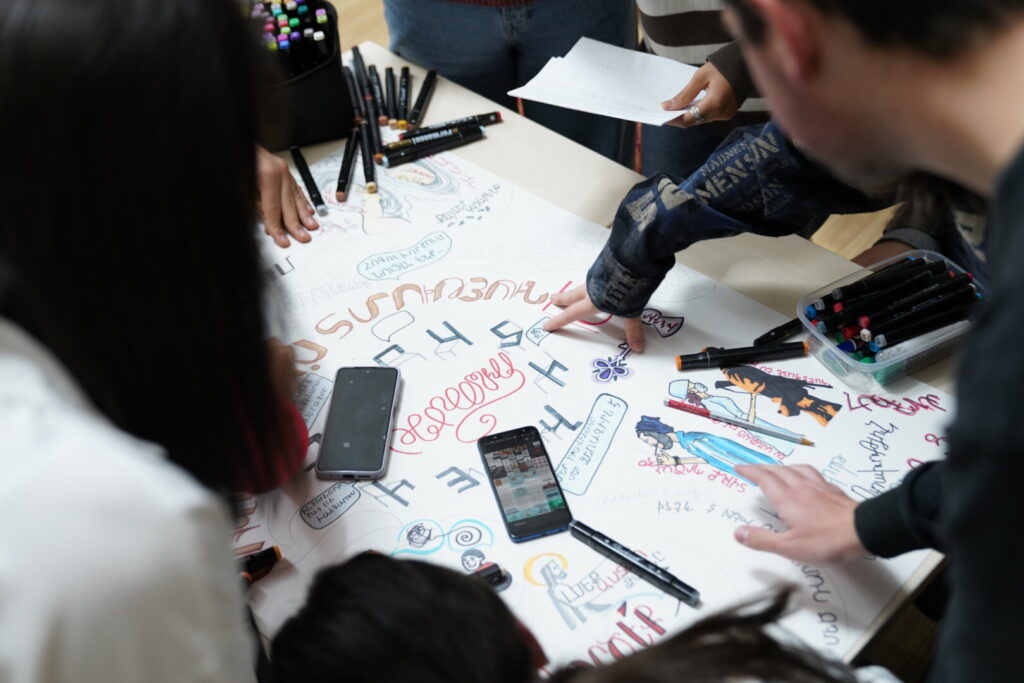
The story of a middle-aged male war veteran who participated in the small-group program reflected the experience of many of the participants. At the first session he said, “I’m facing the edge of a canyon, and I’m haunted by the idea of stepping into it”. By the final session this had been re-authored to “I’m still standing at the edge of the canyon, but now I’m staring at its face, the wind is blowing on mine, and I’m telling it ‘here I am, I’m still standing’”.
One of the youngest participants had acquired numerous physical injuries and was experiencing additional hardships in his recovery. In the last small-group session he said:
Imagine if there was a magical portal that all the Armenians could go through – millions of people who could get in touch with their stories, with the stories of other people representing other sides of the same stories, connecting these stories with other, stronger narratives of their lives. A whole nation could change, could recover from trauma.
We learnt in these groups that it could be a very touching sign of regaining personal agency when someone who came here with an authentic call for help later requested to become part of future groups to try to empower others in their revival journeys. One of the groups consisted of women of all ages, and they became an empowering circle of support for the six narrative practitioners working in the field.
In summary, the Armenian narrative practitioners running these programs learnt a lot, and this has helped the Armenian Spiritual Revival Foundation to develop a more ambitious program that will be launched soon.
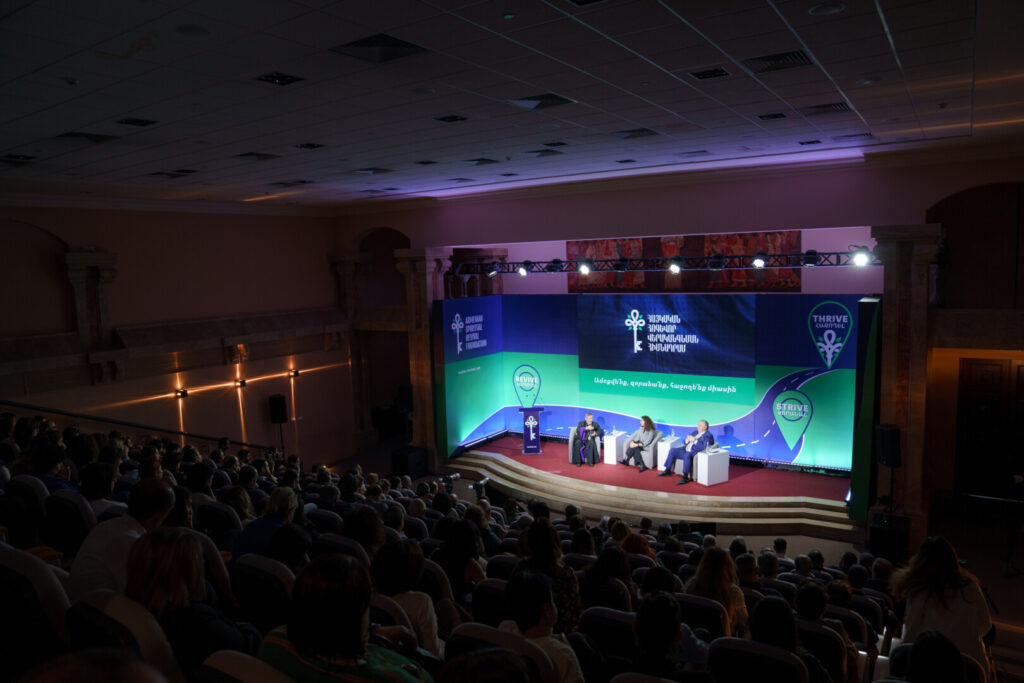
Next: The Armenian Revival Journey
The upgraded version of the program was dubbed the “Armenian Revival Journey”. It will be available to diverse groups of participants beginning in October 2024. The main goals of this journey are to support those seeking to experience psycho-spiritual revival, and to help them re-author stronger narratives about their futures. We hope this will lead to positive changes in life, an increased sense of being able to cope, and a greater sense of belonging to the community. The Foundation will also grow resilient local social support networks that will become a resource for others in the community.
The Armenian Revival Journey consists of three stages:
Revive → Strive → Thrive
This emphasises that the program is part of a journey and represents a process; it is not an end in itself. It is estimated that this revival journey program will run over about three months. The aim is to thicken the more resilient narratives in people’s lives, nurture their personal and spiritual growth, and support them in becoming part of local support networks through which they can contribute to others with similar experiences. This program will be offered to people who experienced trauma associated with the 2020 war and its continuing reverberations, whether the person was on the battlefield, served as volunteers in the rear or has been affected by the war’s broader consequences. The Armenian Revival Journey will respond to this most urgent need in our society.
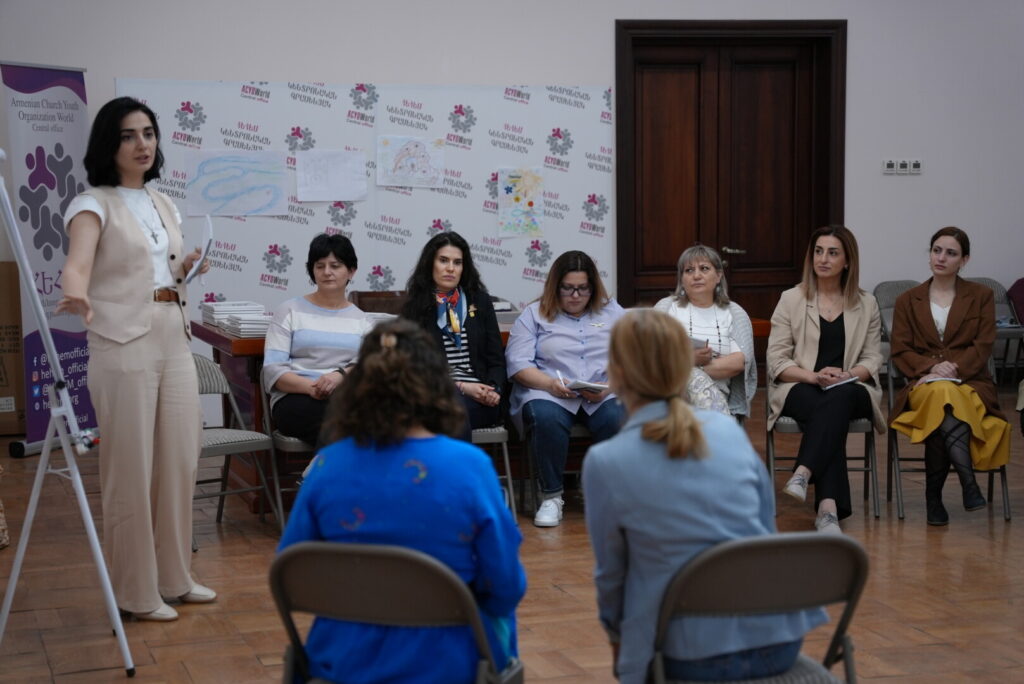
The Armenian Revival Journey will begin with a six-week small-group program, rooted in collective narrative practice. We will work with participants to externalise their hardships and re-author stronger narratives linked to preferred futures. After the small-group program, participants will then be invited to join a larger group of up to 30 participants who will be supported to develop a stronger sense of belonging in the community and in which they can learn from each other’s ways of managing during challenging times. This work will be enriched with structured sessions encouraging “active historical thinking” and nurturing spiritual values in the community life. The third milestone of the journey will be a community gathering, featuring a narrative theatrical performance exploring the dominant and alternative narratives of the community. The performance will be accompanied by discussions about participants’ personal and collective futures using outsider-witnessing practices. We will invite each participant to bring a close friend or family member to witness the final steps of their revival journey and share the joy with community. This part of the program seeks to strengthen the community and connect people’s individual revival stories into a shared narrative.
The Armenian Spiritual Revival Foundation, with the support of the Dulwich Centre Foundation and other partners, is looking forward to continuing its close partnerships to develop and deliver this program and continue improving its efficiency and impact.
Notes
- Noubar Afeyan, an Armenian–American philanthropist and Founder of the Armenian Spiritual Revival Foundation, has described the Armenian people as “super-survivors” for their ability to rise following many crises over past centuries.
- The Armenian Spiritual Revival Foundation was established by Noubar Afeyan, together with His Grace Archbishop Khajag Barsamian, the Representative of the Armenian Apostolic Church to the Vatican. The vision of the Foundation is to create innovative psycho-spiritual methods of healing from traumatic experiences by combining the three cornerstones:
- the historical experiences of Armenian “revivalism”
- Armenian spiritual values
- cutting-edge methods in counselling and community work.
The Foundation pursues a global mission to bring innovative psycho-spiritual solutions to the field of post-traumatic healing and create programs for personal and spiritual growth in group and community settings.
- Beginning in Summer 2023, a partnership with Dulwich Centre Foundation, and close collaboration with Cheryl White, David Denborough and David Newman from Dulwich Centre Foundation, as well as Sara Portnoy from University College London Hospitals and Natalia Savelyeva, a narrative therapist from the Czech Republic, has encouraged the Revival Foundation to adopt a narrative therapy approach.
Acknowledgments
The Armenian Spiritual Revival Foundation and the authors would like to express profound appreciation for support, mentorship and feedback to Cheryl White, David Denborough, David Newman, Sara Portnoy, Natalia Savelyeva and many others. This essay and our reflection on the broader impact of our projects would have been more difficult without the kind invitation extended by Hugh Fox and the UK Institute of Narrative Therapy to participate in the 2024 Conference of Narrative Therapy and Community Work in Liverpool, UK, where the team met with experienced and dedicated practitioners in the field. The authors also wish to acknowledge the editorial contribution of Armenian Spiritual Revival Foundation CEO Hovhannes Nikoghosyan in finalising this piece.